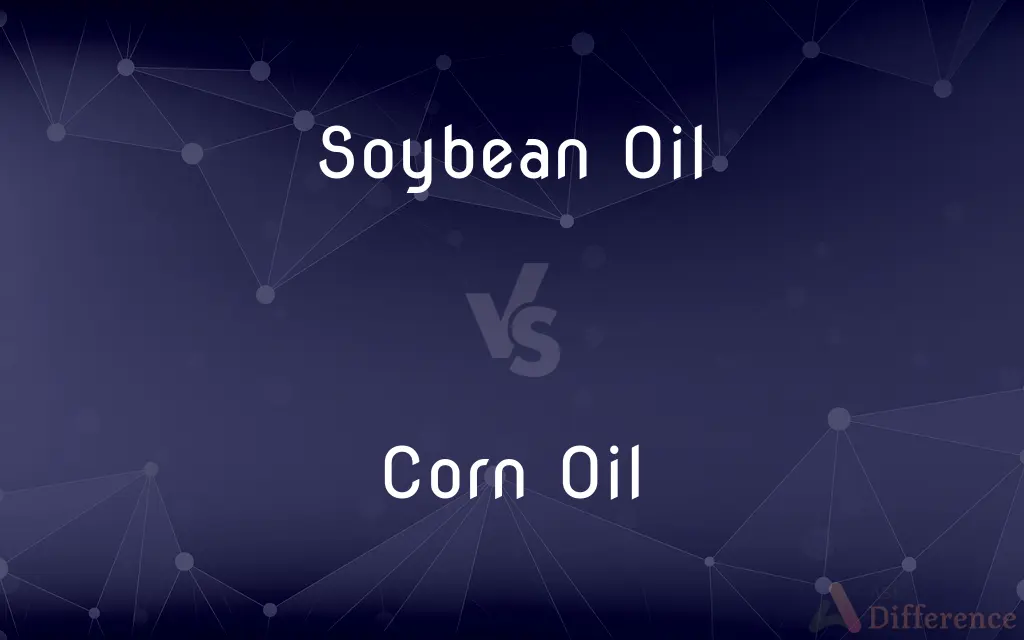Soybean Oil vs. Corn Oil — What's the Difference?
By Tayyaba Rehman — Published on January 2, 2024
Soybean oil is derived from soybeans and is high in polyunsaturated fats, while corn oil, extracted from corn kernels, is rich in monounsaturated fats.

Difference Between Soybean Oil and Corn Oil
Table of Contents
ADVERTISEMENT
Key Differences
Source and Composition: Soybean oil is extracted from soybeans and typically has a higher content of polyunsaturated fats. Corn oil, on the other hand, is derived from the germ of corn kernels and is noted for its higher monounsaturated fat content.
Health Impacts: Soybean oil contains omega-3 fatty acids, beneficial for heart health, whereas corn oil is high in omega-6 fatty acids but lower in omega-3s, which can impact the omega-6 to omega-3 ratio in the diet.
Cooking Uses: Soybean oil has a relatively high smoke point, making it suitable for various cooking methods, including frying. Corn oil also has a high smoke point, often preferred for frying due to its mild flavor.
Nutritional Profile: Soybean oil is rich in Vitamin K and low in saturated fat, making it a heart-healthy option. Corn oil contains vitamin E and phytosterols, which can help lower cholesterol levels.
Production and Environmental Impact: The production of soybean oil often involves large-scale soy plantations, which have environmental impacts like deforestation. Corn oil production is linked to large-scale corn farming, which can contribute to soil erosion and pesticide use.
ADVERTISEMENT
Comparison Chart
Fat Composition
Higher in polyunsaturated fats
Higher in monounsaturated fats
Smoking Point
High, suitable for various cooking methods
High, preferred for frying
Omega Fatty Acids
Higher in omega-3s
Higher in omega-6s, lower in omega-3s
Vitamin Content
Rich in Vitamin K
Contains Vitamin E
Environmental Impact
Associated with deforestation
Linked to soil erosion and pesticide use
Compare with Definitions
Soybean Oil
An oil that can contribute to a heart-healthy diet.
Nutritionists often recommend soybean oil for heart health.
Corn Oil
Corn oil is high in monounsaturated fats.
Corn oil is a staple in kitchens for its health benefits.
Soybean Oil
A vegetable oil extracted from the seeds of the soybean plant.
Soybean oil is commonly used in salad dressings due to its mild flavor.
Corn Oil
Known for its mild taste and high smoke point.
Corn oil is my go-to for stir-frying vegetables.
Soybean Oil
Soybean oil is known for its high content of polyunsaturated fats.
Many health-conscious cooks use soybean oil for its beneficial fatty acids.
Corn Oil
Contains phytosterols that help in lowering cholesterol.
Including corn oil in your diet can aid in cholesterol management.
Soybean Oil
Soybean oil is often used in processed foods and margarines.
Check the ingredients list for soybean oil in your favorite snacks.
Corn Oil
A byproduct of corn milling used in various culinary applications.
Corn oil is a key ingredient in many salad dressings.
Soybean Oil
A versatile cooking oil with a high smoke point.
Soybean oil is ideal for frying vegetables due to its high smoke point.
Corn Oil
A popular cooking oil extracted from the germ of corn kernels.
Corn oil is often used for deep-frying due to its neutral flavor.
Common Curiosities
What is soybean oil?
It's a vegetable oil extracted from soybeans, high in polyunsaturated fats.
Does soybean oil contain omega-3 fatty acids?
Yes, it contains omega-3 fatty acids, which are beneficial for heart health.
Is corn oil good for high-heat cooking?
Yes, corn oil has a high smoke point, making it ideal for high-heat cooking like frying.
Are there any environmental concerns with soybean oil production?
Yes, its production is often linked to deforestation and other environmental issues.
What is the main difference in fat composition between soybean oil and corn oil?
Soybean oil is higher in polyunsaturated fats, while corn oil is richer in monounsaturated fats.
What are the health benefits of corn oil?
Corn oil is high in monounsaturated fats and phytosterols, beneficial for heart health.
Does soybean oil have any use in processed foods?
Yes, it's commonly used in processed foods, margarines, and as a cooking oil.
Can soybean oil be used for frying?
Yes, its high smoke point makes it suitable for various cooking methods, including frying.
How does soybean oil impact cholesterol levels?
Soybean oil, being low in saturated fat, can contribute to maintaining healthy cholesterol levels.
Can soybean oil be used in salad dressings?
Yes, its mild flavor makes it suitable for salad dressings and similar uses.
Is corn oil a healthy choice for cooking?
Yes, due to its heart-healthy fats and vitamin content, it is considered a healthy cooking oil.
What vitamins are present in corn oil?
Corn oil contains vitamin E and is also known for its phytosterol content.
What is the smoke point of corn oil?
Corn oil has a high smoke point, making it suitable for frying and high-heat cooking.
Can corn oil help in lowering cholesterol?
Yes, the phytosterols in corn oil can help lower cholesterol levels.
What are the environmental impacts of corn oil production?
Corn oil production can contribute to soil erosion and requires significant pesticide use.
Share Your Discovery

Previous Comparison
Distance Vector Routing vs. Link State Routing
Next Comparison
Static Memory Allocation vs. Dynamic Memory AllocationAuthor Spotlight
Written by
Tayyaba RehmanTayyaba Rehman is a distinguished writer, currently serving as a primary contributor to askdifference.com. As a researcher in semantics and etymology, Tayyaba's passion for the complexity of languages and their distinctions has found a perfect home on the platform. Tayyaba delves into the intricacies of language, distinguishing between commonly confused words and phrases, thereby providing clarity for readers worldwide.













































